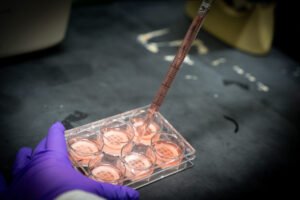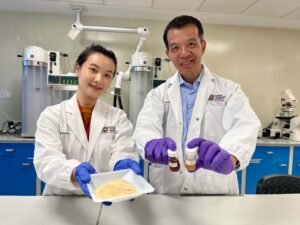Friday, 27 February 2026

September 20, 2024 | Academic
Georgetown University food expert debuts white paper on UPF
The white paper provides additional data and information to help inform policymakers, public health officials, nutrition professionals A new white paper on ultra-processed foods (UPF) was published by the Georgetown University McDonough…

September 6, 2024 | Academic
Bezos Centre for Sustainable Protein opens at NSU
Backed by $30Mn from the Bezos Earth Fund, the centre aims to revolutionise sustainable protein research and commercialisation in Asia The Bezos Centre for Sustainable Protein at the National University of Singapore (NUS) was launched today,…

August 30, 2024 | Academic
Jasmine Food Corporation launches educational initiative on rice in Malaysia
Raising awareness of the importance of supporting local agriculture and making environmentally conscious food choices Jasmine Food Corporation Sdn. Bhd., a leader in Malaysia’s rice industry, is delighted to announce the launch…

August 19, 2024 | Academic
UNM Food partners with Starship Technologies to launch robot delivery service
Starship’s fleet of autonomous, on-demand robots will deliver from eight campus eateries: Blake’s Lotaburger, Draft & Table, Dion’s, Einstein’s Bros. Bagels, Mandalay Express, Starbucks, Subway, and The Drop Grubhub and Starship Technologies, in partnership…

August 8, 2024 | Academic
CytoNest launches commercial product for cell-based meat production
The product, called CytoSurge 3D fibre scaffold, has applications in cell research, biopharmaceuticals, cell therapeutics, and cultured meat and seafood development University of Georgia startup CytoNest Inc. released its first commercial…

August 1, 2024 | Academic
NTU Singapore and Bunge to craft new food flavours via fermentation
In a research collaboration agreement, Bunge will develop the new flavours by leveraging the research capabilities and technologies at NTU’s Food Science and Technology Programme (FST) NTU Singapore and Bunge, a leading global…

July 29, 2024 | Academic
University of Stirling finds Pickle Juice effective in preventing muscle cramping
The study conducted by Thomas Cannon has once again proven Pickle Juice’s effectiveness in stopping and preventing muscle cramps A groundbreaking study conducted by Thomas Cannon at the University of Stirling reveals that Pickle Juice significantly prevents muscle…

July 26, 2024 | Academic
Archer Roose and Cornell University revolutionise canned wine category
Award-winning study unveils groundbreaking solutions to key quality challenges, paving the way for future wine innovations Archer Roose, a trailblazer in the premium canned wine sector announced its collaboration with Cornell…

July 25, 2024 | Academic
La Trobe Institute to tackle Australia’s food security
LISAF will establish a $28 million ARC Industrial Transformation Research Hub for Protected Cropping (PC Hub) with funding from the Federal Government Australia based La Trobe Institute for Sustainable Agriculture and Food (LISAF) officially…

July 23, 2024 | Academic
MSU, CANR partner with African Food Security
This collaboration will bring a major aspect to our development of a world-class project on the African continent via skills transfer Michigan State University (MSU) College of Agriculture and Natural Resources…
Technology
Ingredion Thailand Achieves 100% Sustainably Sourced Cassava
Feb 27, 2026 | Company News
Deakin University and Bellarine Foods Partner to Develop Sustainable Marine-Derived Proteins
Feb 26, 2026 | Australia
Royal Unveils Refreshed Jute Bag Design for 20lb Authentic Basmati
Feb 25, 2026 | Company News
Food Testing
Australian Medical Bodies Push for Compulsory Health Star Labelling
Feb 24, 2026 | Australia
Tim Hortons Singapore Secures Majlis Ugama Islam Singapura Halal Certification Ahead of Ramadan
Feb 23, 2026 | Company News
More Popular
Fagron Acquires Pharmavit Europe for €68Mn to Expand Nutraceutical Portfolio
Feb 27, 2026 | Company News
Arla Foods Invests EUR 300Mn in New Cheese Dairy in Sweden
Feb 27, 2026 | Company News
Beyond Meat Broadens Portfolio Beyond Protein with Sparkling Plant-Based Drink Line
Feb 27, 2026 | Beverages






